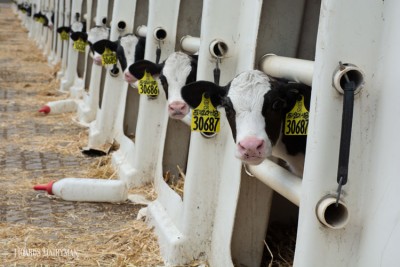Know your calves to catch illnesses early by Carla Wardin

Know your calves to catch illnesses early
BY CARLA WARDIN, MICHIGAN DAIRY FARMER
Since calves are highly susceptible to disease, farmers should be using both physical and behavioral indicators to help identify a potential illness. Monitoring calves frequently for changes helps for early intervention and improves the long-term outcomes.
"In addition to physiological kinds of disease, calves will also exhibit a range of behavioral changes when they're ill," said Alycia Drwencke, Cornell Cooperative Extension Regional Dairy Specialist. "Oftentimes these behavioral changes can be identified earlier than many of physical signs they can present, so it really makes it extremely important to pay close attention to what they're doing, to know if they're going to deviate from normal."
Look for these signs
Behavioral changes to monitor include:
- Human interaction
- Grooming
- Feed and water intake
- Isolation
- Posture
- Play behavior
- Length of time lying down
Monitoring these behaviors regularly can help farmers identify if calves are healthy or experiencing a health event.
To help with diagnosis and treatment, University of Wisconsin researchers developed a system for diagnosing respiratory issues that assigns a score for symptoms.
"You're basically going to assign a score to the calf based on these areas," Drwencke said during "Recognizing and Diagnosing Disease," a Cornell Cooperative Extension podcast. "If she has a cough, you're going to give her two points, if she has a fever above 39.2°C (102.5°F), you're going to give her two points. If she has nasal discharge, you're going to give her four points," said Drwencke. "What these researchers establish is that if a calf scores a total of five of higher, you're going to classify this as a respiratory case. You can use that knowledge to further make your treatment and management decisions."
What about scours
As for infectious causes of diarrhea, it can be helpful to use a resource noting the typical age range when cattle are infected with each pathogen. This can help with choosing the correct treatment.
I think it's really important to note that the first line of defense in scouring calves shouldn't necessarily be antibiotics. What we're going to recommend is that your first line of defense is water and electrolytes to keep those calves hydrated," Drwencke said.
Not only does early intervention improve outcome, but it also reduces cost. Options for observation include a technological approach, such as using an activity monitor and data from auto feeders.
"Or you can simply take the time to do some good, old-fashioned observation in person," Drwencke said.
Upcoming Events
Crops, Cows & Critters - Southwest New York Dairy, Livestock & Field Crops Newsletter Sponsorship
December 19, 2025
Our two forms of publications feature research-based and timely information from our four specialists, listed to the right, along with local event notifications and Cornell University outreach. This information is provided to participants who range from dairy, livestock, and field crops producers to agricultural suppliers and consultants.
Weekly Email Update: Shared with 625+ households who have signed up with our program.
Monthly Paper Mailer: To reach our stakeholders and farmers who lack internet access, we send out a monthly mailer where your company's logo and contact information would be featured with a mailing list of 330+ households.
If you sponsor our weekly and monthly publications you reach approximately 955 households.
Visit our website to view our newsletters!
2025 Cornell Food Beverage & Animal Feed Manufacturer Survey
December 19, 2025
Industry and Educational Advocates for New York State's Food, Beverage, and Animal Feed Manufacturing industries:
As you know, NYS has a diverse food and beverage manufacturing industry, in both the types of industries that exist and the wide distribution of firms by scale. Many manufacturing firms have strong backward linkages to agricultural production sectors in the state that support both farm-level and downstream food industry firms and consumers. In collaboration with the New York State Department of Agriculture and Markets, a team from Cornell University's Charles H. Dyson School of Applied Economics and Management has recently rolled out the 2025 New York State Food, Beverage, and Animal Feed Manufacturer Survey. The industry will benefit from an updated assessment of the industry that informs private and public investments and opportunities to support firm growth and improved profitability.
Cornell Organic Field Crops & Dairy Conference
March 6, 2026
Waterloo, NY
Farmers, researchers, educators, and agricultural service providers from across the Northeast are invited to the 2026 Cornell Organic Field Crops & Dairy Conference, held Friday, March 6, 2026, from 8:00 a.m. to 4:30 p.m. at the Lux Hotel & Conference Center in Waterloo, N.Y.
Co-hosted by New York Soil Health and Cornell CALS, the annual conference brings together leaders in organic grain, dairy, and livestock systems to share practical tools, new research, and farmer-tested strategies to support resilient and profitable organic production.
Announcements
No announcements at this time.





